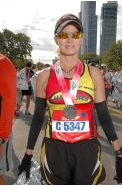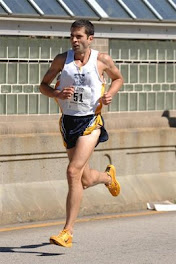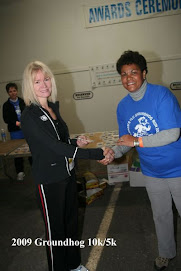I could write a full essay on each of these, but thought I'd quickly list out key elements of how I focus on my recovery, along with a few references here and there:
- Full Night's Sleep. Or, as is often in my case "eight hours of head down time." I actually had to promise to this before Vince would agree to give me more intense training as I prepare for Chicago. Although not always a great sleeper, I do commit to "head on pillow" time of at least eight hours per night, with few exceptions.
- Mind Body Connection. Admit it; you've found yourself in the middle of a crisis and you've gotten sick, a backache, a headache or some other manifestation of pain. When you are stressed or worried, your body releases stress hormones and kicks off a chain of reactions--chemical and otherwise--that lower the immune system and impede recovery. Your body will do what you tell it to do. Believe and visualize you are recovering and you can accelerate it. When you tell your body that you just "can't recover" or allow yourself to fret on end, your body will listen to you. Next time you have pain or exhaustion or stress, imagine your body healing and restoring itself. Visualize it several times per day.
- Calcium. This coming from someone who doesn't drink milk, eat yogurt and rarely eats any cheese. And, I hold nearly every risk factor for a stress fracture (but have never had one). Calcium can be a complicated equation. Calcium supplements alone are not enough--you must assure your body has everything it needs to absorb calcium in order build and maintain bone. You need vitamin D, K, magnesium. You need to watch the pH of your food so you don't contribute to the bone loss that already occurs every day. Don't forget--sunlight is great for vitamin D. There are some things that actually bind to calcium, therefore flushing it from the body. Do your research.
- Glutamine. Intense exercise drains your body of glutamine. Consider taking a glutamine supplement to boost your immune system and aid recovery during periods of intense exercise. I put a micronized powder version in a recovery drink daily.
- BCAAs. Branch chain amino acids supplementation before, during, or after exercise may have a strong effect on improving muscle protein balance. A powerful combination when you are also supplementing with Glutamine. Give it some time though. My weight initially increased the first couple of weeks (which made me stop in a panic the first time I tried), but then stabilized as my body fat dropped when I decided to be more patient.
- Omega 3s / Fish Oil. The Anti-inflammatory properties, mood balancing effects and cardio-vascular benefits well-proven, and are enough reason to take Omega 3s every day.
- Glycogen recovery. Glycogen is the runner's primary fuel. Immediately before, during and after a workout are the times for high-glycemic carbs. Your muscles are a sponge crying out to have their glycogen replenished. This is the one time you want your insulin to rise quickly and facilitate glycogen refill. Whether you do it quickly, so you aren't lagging and sluggish for days, or whether you do it slowly is largely controlled by you.
- Electrolytes. Potassium, magnesium, sodium play key roles in muscles contraction and relaxation, are required for proper nerve firing and brain function, and help wash away metabolic wastes that can contribute to sluggishness. They are also critical to the rehydration process. When your electrolytes drop, muscles cramp and fatigue can occur more quickly. Like the 30K mark for me on Ottawa (ouch!). I actually take potassium and magnesium supplements daily, as well as eat foods rich in them (like potatoes and bananas). If you experience arrhythmias and your doctor has cleared them as benign, try reaching for magnesium next time they flare up.
- Stretching. I recently read somewhere for about the third time in as many months that stretching can actually be detrimental if you are a runner. Note the emphasis on "before" running and "static stretching." When your muscles heal from their micro-tears, they form scar tissue. That tissue needs to be broken up through stretching (and massage if that's available to you). Proper stretching will also increase your mobility and flexibility. Check out "Active Isolated Stretching." The Wharton's (featured in Runner's World) have quite a program around this method, that I use nearly every day. Post-run, usually in the evening, and it also helps me relax and prepare for the 8 hours of rest that's coming my way.
- Chiropractic adjustments. With an extra cervical vertebrae, some lower-spine abnormalities as well as a slight leg length imbalance, this is part of my injury / pain prevention routine. If I'm not visiting Dr. Reed on a regular basis for a touch up adjustment, I will find myself in grinding pain somewhere unpleasant and need to get there in a hurry. I've found chiropractors vary widely in their abilities and knowledge. I've found one that treats runners and other competitive athletes. Every time I go, the first thing he does is measure my leg length to get a quick overview of my current status. And he's always right on. Lately, my leg length has been very even due to the routine care I receive--and I can really feel the difference.
- Treadmill runs. This one may have surprised you, but it's one of my best kept secrets. Running on a treadmill is easier on everything compared to outside. It's like running in a laboratory. No rocks, no road camber, no cracks, no hills, no pavement, no holes (oh, and bonus--NO DOGS!). The impact is minimal and there is little stress on your bones. While you should never do all of your runs on a treadmill (or you will be ill-prepared for running elsewhere, and sorely regret it--pun intended), a few of your weekly recovery miles--esp. if you are watching some nagging pain or have an injury--on a treadmill will help you keep your cardiovascular fitness up, while easing your body back into harder miles. Remember, you have to keep your incline at one percent to equal the speed of a flat surface on the road (due to no wind resistance and the belt moving).
- Ice. The panacea for just about every pain you've got, the more quickly the better. If you can point to a pain, ice it. It's that simple. Ice baths (for at least 15 minutes), ice soaks, ice packs, whatever works. And no you won't freeze your skin off. I can't believe how many well meaning people think you have to put a thick towel in between you and the ice bag. If it doesn't feel cold, you aren't icing it.
- Self Massage. I wish I could find the time to go to a masseuse weekly. I can't. But that doesn't stop me from using the stick (I use this one), a hand-held massager or just my good old right and left to smooth out my quads or calves if they are a little stiff.














_s_jpg.jpg)









No comments:
Post a Comment